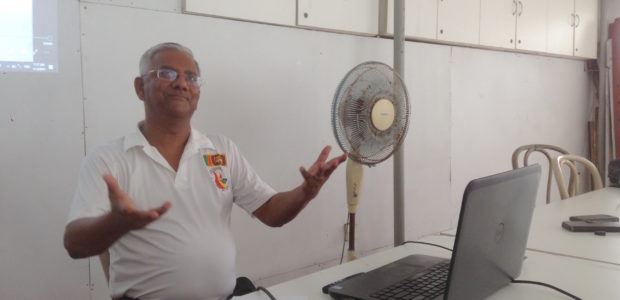In Conversation with Bertal Pinto-Jayawrdena
How the Unity Trust maintains harmony
“I stopped reading one of the five English newspapers I regularly buy. It had provocative articles, full of hatred and it was not sensitive to ethnic issues at all” says Bertal Pinto-Jayawardena, a former People’s Bank employee and Founder of the Unity Mission Trust. The Catamaran interviewed Mr. Pinto-Jayawardena who spoke to us about his thoughts on the media playing a key role in spreading hate speech.
THE CATAMARAN: Can tell us about why you founded the Unity Mission Trust?
After the war ended in 2009, a team from the south went to Menik Farm in the North to help the 200,000 affected people in the camps. While we took essential items like milk powder for distribution, we realized the quantity wasn’t sufficient for the number of people in the camps. Since our primary focus was children’s needs, we started collecting more milk powder and eventually managed to supply the Menik Farm camp with their requirements for 6 months.
Our next focus was on education. We sought the help of teachers within the camp to provide the children with the education they needed. We even looked into the needs of the teachers so they could conduct classes under a tree.
Eventually, many refugees returned to their homes but our support didn’t end there. We went to their hometowns and started helping students. During this time, we also visited Kayts where we carried school shoes for children and other learning equipment. When we handed over a pair of shoes to a 6 year old girl, she asked us “what can I do with this…?” and it brought tears to our eyes. This is the sad outcome of this war. The girl’s question became one of the biggest contributors to the creation of our charity organization, the Unity Trust Mission. The determination to unite and build racial and ethnic ties devoid of religious and ethnic differences was the key to our success.
THE CATAMARAN: What are the current activities carried out through your organization?
Today, the organization has grown with 21 branches nationwide. The children we once assisted are youth now and we continue to assist them in various ways. We conduct goodwill programmes with Tamil and Sinhala children and advise youth on study and employment opportunities. We also use these programmes to have conversations around religion and ethnicity.
THE CATAMARAN: How do you cope with language barriers when conversing with Tamil children?
We initially worked with translators but we also taught these children English and Sinhala. Many of them maintain contact with us in English now. They use English when communicating within the group using modern technology.
THE CATAMARAN: How do you think the diversity of our country can be maintained?
As Sri Lankans we must work together. When we work as Sri Lankans, we come to know all cultures and we can get around all cultures. As much as we value our ethnic and religious culture, we must also respect other ethnic and religious cultures.
Take Islam, for example; it is a beautiful religion with a lot of great ideas. It is a religion that teaches the way of life. But today, many are in the opinion that Islam is Wahabism. Islam is not Wahabism. For me, Wahabism is completely different from the teachings of Islam. There are many things that we need to learn from Islam, as to what ‘Islam’ is and how not to be afraid of propaganda around the faith. We refer to it as a guide to our life. We still teach that to our children today. These are ways to maintain diversity.
THE CATAMARAN: Where did we go wrong building ‘unity’ all these years? How do we fix it?
This is an issue with profound political implications and the media had played a huge negative role in it. I stopped buying and reading one of the five English newspapers I regularly buy. It had provocative articles full of hatred, and that paper was not sensitive to ethnic issues at all.
Next are the schools! They are the major contributor to unity or the lack of it. These problems can be solved if segregation such as Sinhala, Tamil, Hindu, Christian, Muslim and Buddhist is done away with in schools and establish mixed schools of all ethnicities and religions.
THE CATAMARAN: What is the position of youth in your groups after the Easter Sunday attack?
Two children from our Negombo Regional Branch stopped attending our meetings. After the April 21 incident, their parents had told them not to work with us. They are representatives of a uniquely grown-up community. Such mentalities are passed onto the next generation. Such psyches are more frequent among parents than among children.
A Muslim who worked in an office took Biryani for his coworkers during the last Ramazan festival but no one had consumed it due to the fear of contraceptive drug in it. Only one person volunteered to eat the meal. That was a child from our group. A few came forward to eat the meal after that.
Similarly, a Muslim student from Elpitiya, admitted to university was acquainted with Sinhala friends in the early days. After the April 21 incident, her friends began to avoid her. Because of their hate speech, she almost suspended her university education midway. But one student who is a member of our group had continued to maintain friendship with her consoled her. That friendship is what keeps her pursuing university education. These are our children’s own experiences.










